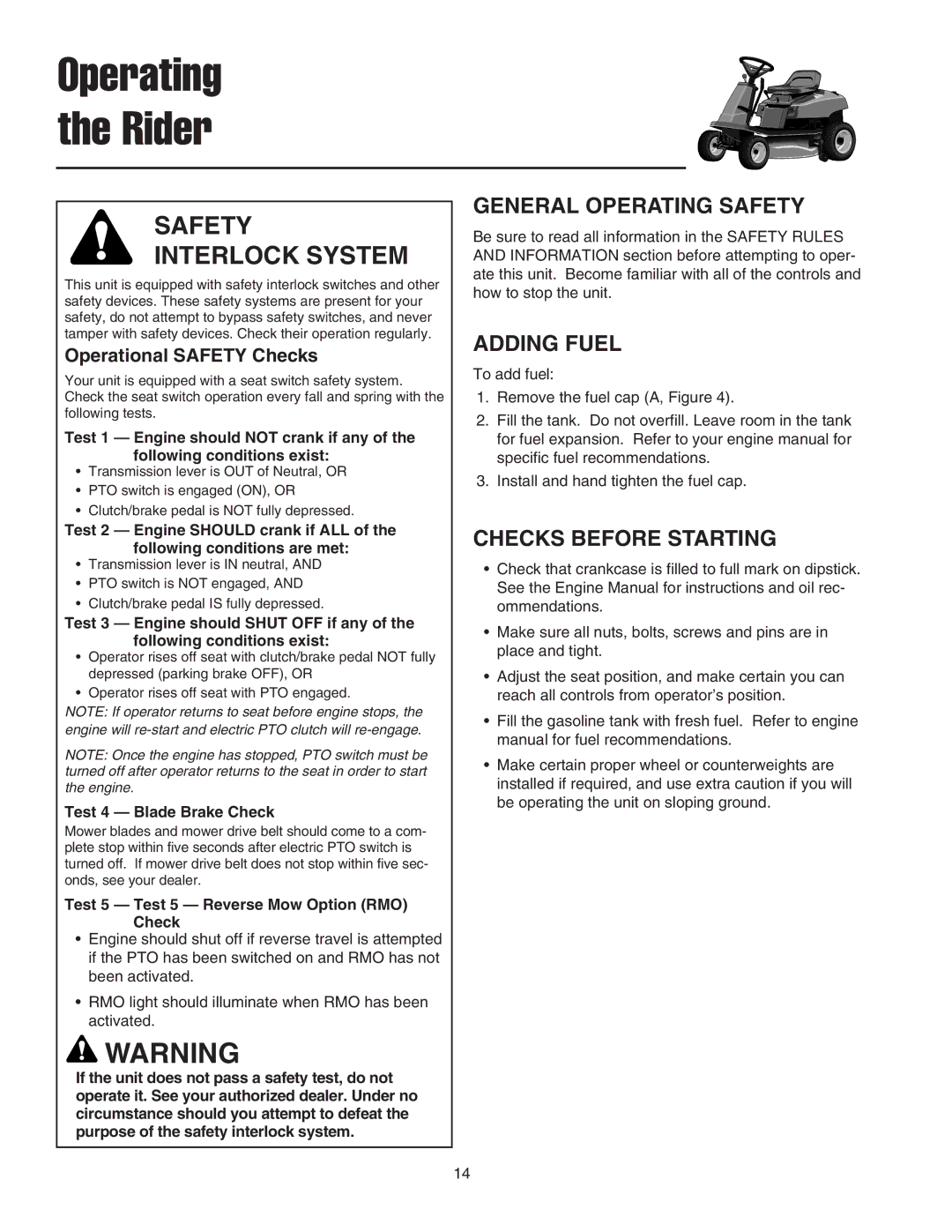
Operating the Rider
SAFETY
INTERLOCK SYSTEM
This unit is equipped with safety interlock switches and other safety devices. These safety systems are present for your safety, do not attempt to bypass safety switches, and never tamper with safety devices. Check their operation regularly.
Operational SAFETY Checks
Your unit is equipped with a seat switch safety system. Check the seat switch operation every fall and spring with the following tests.
Test 1 — Engine should NOT crank if any of the following conditions exist:
•Transmission lever is OUT of Neutral, OR
•PTO switch is engaged (ON), OR
•Clutch/brake pedal is NOT fully depressed.
Test 2 — Engine SHOULD crank if ALL of the following conditions are met:
•Transmission lever is IN neutral, AND
•PTO switch is NOT engaged, AND
•Clutch/brake pedal IS fully depressed.
Test 3 — Engine should SHUT OFF if any of the following conditions exist:
•Operator rises off seat with clutch/brake pedal NOT fully depressed (parking brake OFF), OR
•Operator rises off seat with PTO engaged.
NOTE: If operator returns to seat before engine stops, the engine will
NOTE: Once the engine has stopped, PTO switch must be turned off after operator returns to the seat in order to start the engine.
Test 4 — Blade Brake Check
Mower blades and mower drive belt should come to a com- plete stop within five seconds after electric PTO switch is turned off. If mower drive belt does not stop within five sec- onds, see your dealer.
Test 5 — Test 5 — Reverse Mow Option (RMO) Check
•Engine should shut off if reverse travel is attempted if the PTO has been switched on and RMO has not been activated.
•RMO light should illuminate when RMO has been activated.
![]() WARNING
WARNING
If the unit does not pass a safety test, do not operate it. See your authorized dealer. Under no circumstance should you attempt to defeat the purpose of the safety interlock system.
GENERAL OPERATING SAFETY
Be sure to read all information in the SAFETY RULES AND INFORMATION section before attempting to oper- ate this unit. Become familiar with all of the controls and how to stop the unit.
ADDING FUEL
To add fuel:
1.Remove the fuel cap (A, Figure 4).
2.Fill the tank. Do not overfill. Leave room in the tank for fuel expansion. Refer to your engine manual for specific fuel recommendations.
3.Install and hand tighten the fuel cap.
CHECKS BEFORE STARTING
•Check that crankcase is filled to full mark on dipstick. See the Engine Manual for instructions and oil rec- ommendations.
•Make sure all nuts, bolts, screws and pins are in place and tight.
•Adjust the seat position, and make certain you can reach all controls from operator’s position.
•Fill the gasoline tank with fresh fuel. Refer to engine manual for fuel recommendations.
•Make certain proper wheel or counterweights are installed if required, and use extra caution if you will be operating the unit on sloping ground.
14
